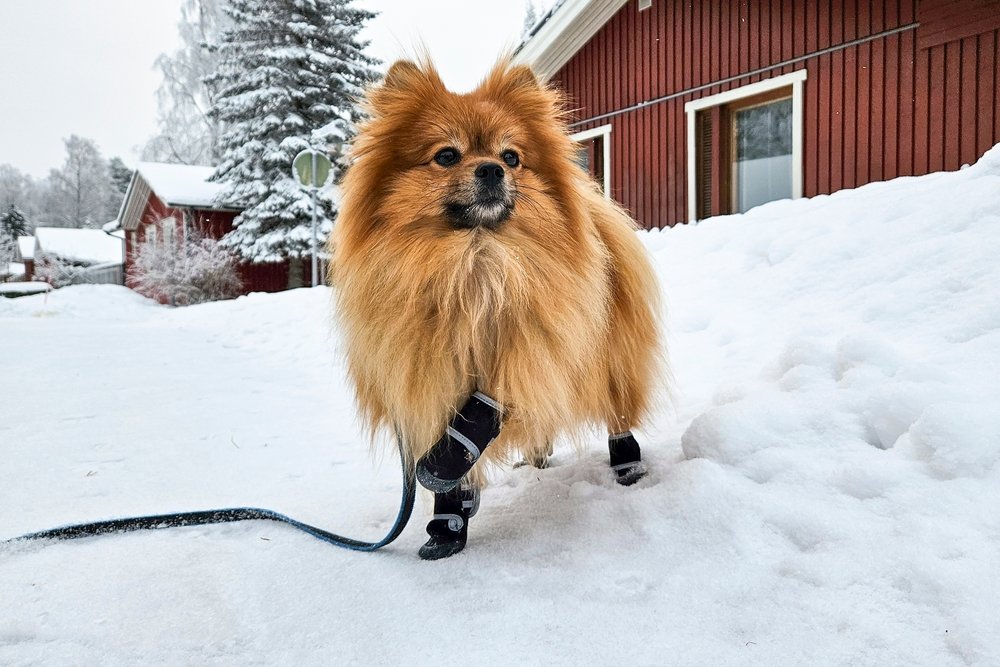Winter can be a challenging time for our pets. The temperature is one thing, but it also poses new health risks that don’t exist when conditions are less demanding. Staying warm is crucial since it can affect an animal’s chances of staving off hypothermia. Other concerns rest with their extremities, including their paws, as they come in direct contact with the cold.
Some breeds, like Siberian Huskies, are more cold-tolerant than others. They have adapted to these extreme conditions in ways that make it less stressful and harmful for them. They seem to relish the freezing temperatures. However, protecting a dog’s paws must be at the forefront because these body parts are vulnerable to frostbite and its complications.


Before You Start
Several factors affect the safety of walking your dog outside. Snowstorms are an obvious issue, but bitter wind chills and extreme temperatures are another concern. The cold will impact small pets more than large animals because of their varying surface area ratios. So, you might consider alternative indoor options like pee pads for toy breeds.
However, there is a lot more that goes into protecting a dog’s paws during the winter. Let’s go over some of our best tips and tricks to ensure your pup’s paws stay protected.


The 10 Tips for Protecting Dog Paws During Winter
1. Check the Conditions Before Heading Outside
A walk during a snowstorm may sound romantic, but your dog may feel otherwise. It can make a simple small task into a big chore. Therefore, we suggest checking the weather before going outside for anything coming your way during your usual time outdoors. You may find a walk in the neighborhood a better choice than hitting the trail if inclement weather is approaching.


2. Keep Your Pet’s Paws in Good Shape
We recommend keeping your dog’s paws in good shape by trimming their nails and clipping the excess hair around their feet. That can prevent ice from forming on their fur and making painful ice balls between their pads. Of course, the more you handle your dog’s feet, the more they will become used to it. It’ll make it more manageable to examine them if you notice your pet limping or showing other signs of discomfort.
3. Invest in a Pair of Dog Boots
Dog boots may seem silly, but they are practical. They can prevent many cold-related injuries by providing an extra layer between your pet’s paws and the frozen ground. The design of these products has come a long way from the old-fashioned, galosh-styled boots. They are more comfortable and secure. Manufacturers have even made them look sporty and fashionable. Just be sure to try different kinds to find a product your dog will tolerate.


4. Get Your Pet Used to Wearing the Boots
Boots are a sound investment, but they do little good if your pet refuses to wear them. Getting your pet used to the feeling of the boots is essential for protecting their paws when it matters most. Treats are an excellent way to overcome any objections your dog may have to them. Reward your pooch and praise them for tolerating the boots, and be sure to keep up with these lessons year-round.
5. Check Your Pet’s Paws Before Going Outdoors
You can avoid many issues with your pet’s paws by checking them before going outside in winter conditions. Cracking and open sores can make them more vulnerable to further injuries and complications. We suggest massaging their pads to determine if there are any problems which could lead to further issues.


6. Buy Some Paw Balm
Sometimes, boots are overkill, and some dogs might refuse to tolerate them. However, that doesn’t mean you should neglect your dog’s paws. We recommend getting some paw balm to protect them during inclement weather. These products are pet-friendly and safe to use for animals that may lick the balm off their paws.
7. Shovel Walkways Around Your House
The chances are that you’re going to walk your dog someplace where it’s already been shoveled. That can reduce problems with their paws. However, take the same message to your home. Make sure to clear all areas where your dog may walk, such as the driveway or pathways they use to run around the house. It’s important to keep these areas free of obstacles to ensure your dog’s safety and comfort.
During the winter, use pet-friendly deicing products to protect your dog’s paws. Regular salt can be harmful to your lawn and pets, so investing in safer alternatives is worth it.
After taking your dog for a walk on sidewalks or pavement treated with deicing products, remember to wipe their paws when they come inside. This prevents them from ingesting toxic substances and protects their paws from damage.
Limit your pet’s time outside during the winter to prevent any adverse effects on their paws. Pay attention to their habits and choose the best times to go outside to minimize their exposure to the cold.
It’s essential to protect your dog’s paws during the winter months to prevent injuries and discomfort. By following these tips and using pet-friendly products, you can ensure your furry friend stays safe and happy in the colder weather. sentence: Please make sure to lock the door before you leave the house.
Rewrite: Before leaving the house, please ensure that the door is locked.

